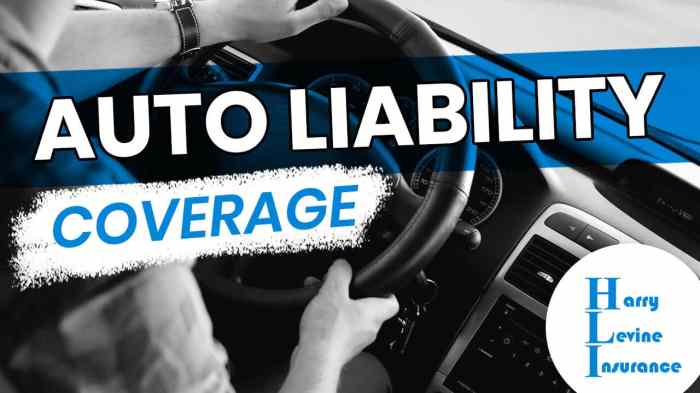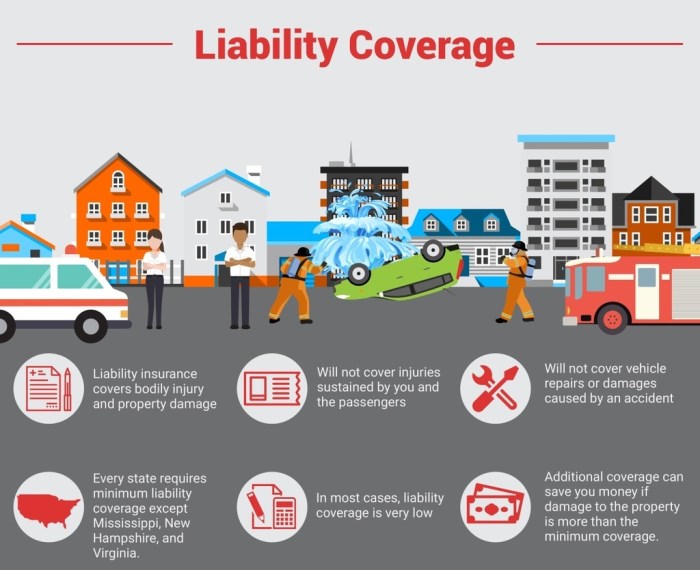What is liability car insurance? It’s a crucial aspect of your auto policy that protects you financially in the event of an accident. Liability coverage ensures that you’re not left holding the bag for damages or injuries caused to others while you’re behind the wheel.
Understanding the ins and outs of liability insurance is essential for every driver. In this comprehensive guide, we’ll delve into the purpose, types, limits, exclusions, and cost considerations of liability car insurance, empowering you to make informed decisions about your coverage.
Liability Coverage
Liability coverage is a crucial component of car insurance that protects you financially if you cause an accident that results in injuries or property damage to others. It’s a legal requirement in most states and provides peace of mind knowing that you have protection in case of an unexpected event.
Liability car insurance, a form of financial protection, safeguards you against potential liabilities arising from accidents caused by your vehicle. If you’re seeking a reliable and flexible financing solution for your vehicle, consider TD Auto Finance , which empowers you to unlock financial freedom for vehicle ownership.
With tailored financing options, TD Auto Finance provides peace of mind, allowing you to focus on enjoying the benefits of car ownership while ensuring your liability car insurance coverage remains intact.
Liability coverage is typically divided into two main types:
Bodily Injury Liability
Bodily injury liability coverage provides financial protection if you cause an accident that results in injuries to another person. It covers expenses such as medical bills, lost wages, pain and suffering, and even funeral costs in the event of a fatality.
Liability car insurance safeguards you financially if you cause an accident, covering expenses such as medical bills and property damage. For a more comprehensive approach to automotive expenses, consider CarMax Finance , a guide to financing your dream car. With its insights, you can make informed decisions about your automotive financing, ensuring a smooth journey on the road ahead.
Property Damage Liability
Property damage liability coverage provides financial protection if you cause an accident that results in damage to another person’s property, such as their vehicle, home, or other structures. It covers the cost of repairs or replacement up to the limits of your policy.
Liability car insurance is an important type of insurance that protects you from financial responsibility if you cause an accident while driving. It covers damages to other people’s property and injuries, as well as your own legal expenses. Liability car insurance is required by law in most states, and it’s a good idea to have even if you’re not required to.
Limits of Liability

Liability limits refer to the maximum amount of money an insurance company will pay for damages or injuries caused by the policyholder in an accident. These limits are crucial in car insurance as they determine the extent of financial protection provided.
Factors that influence liability limits include state laws and personal preferences. State laws often set minimum liability limits that drivers must carry, while personal preferences may lead individuals to opt for higher limits for increased coverage.
Consequences of Exceeding Liability Limits, What is liability car insurance
Exceeding liability limits can have severe financial consequences. If the damages or injuries caused by the policyholder exceed the policy limits, the policyholder becomes personally responsible for the remaining costs. This can lead to significant financial hardship, including:
- Lawsuits and judgments against personal assets
- Garnishment of wages or property
- Bankruptcy in extreme cases
Exclusions and Exceptions: What Is Liability Car Insurance
Liability insurance policies typically exclude coverage for certain types of claims, such as:
- Intentional acts
- Criminal acts
- Acts committed while under the influence of drugs or alcohol
- Bodily injury or property damage caused by a business
- Damage to your own property
These exclusions exist because liability insurance is intended to protect you from financial responsibility for accidents that you cause unintentionally. If you intentionally cause harm or damage, you are not eligible for coverage.
Liability car insurance is a type of auto insurance that covers damages caused to other people or their property as a result of an accident that you cause. It’s an essential form of protection for any driver, as it can help you avoid financial ruin in the event of an accident.
If you’re looking for a reliable and affordable liability car insurance provider, Mahindra Finance is a great option. They offer a variety of coverage options to meet your needs, and their rates are competitive. With Mahindra Finance, you can rest assured that you’re getting the best possible protection for your car and your finances.
Determining Coverage
To determine if a particular situation is covered under liability insurance, you should:
- Review your policy to see if there are any specific exclusions that apply to the situation.
- Contact your insurance company and ask if the situation is covered.
- Consult with an attorney to get legal advice.
By following these steps, you can ensure that you have the coverage you need to protect yourself from financial liability.
Liability car insurance, an essential coverage for motorists, provides protection against financial responsibility in case of accidents. It covers damages and injuries caused to others, ensuring your financial well-being. For a comprehensive guide to managing your finances, refer to Optum Financial: A Comprehensive Guide to Your Financial Well-being . Liability car insurance remains crucial for safeguarding your financial security while on the road.
Cost Considerations

The cost of liability car insurance varies widely depending on several factors. Understanding these factors can help you make informed decisions and potentially reduce your premiums without compromising coverage.
Factors Influencing Premiums
- Deductible:A deductible is the amount you pay out of pocket before your insurance coverage kicks in. Higher deductibles typically result in lower premiums, as the insurance company assumes less risk.
- Driving History:Drivers with a clean driving record, free of accidents and traffic violations, are generally considered lower-risk and thus pay lower premiums.
- Age and Experience:Younger drivers and those with less driving experience are statistically more likely to be involved in accidents, leading to higher premiums.
- Vehicle Type and Usage:Sports cars and high-performance vehicles typically have higher premiums due to their perceived higher risk of accidents.
- Location:Insurance rates can vary significantly depending on the region you live in, as accident rates and insurance claims frequency vary geographically.
Tips for Reducing Costs
While it’s important to have adequate liability coverage, there are ways to reduce the cost without sacrificing protection:
- Increase your deductible:Raising your deductible can lower your premiums, but make sure you can afford the higher out-of-pocket expense if you need to file a claim.
- Maintain a clean driving record:Avoid traffic violations and accidents to keep your premiums low.
- Consider a usage-based insurance program:Some insurers offer programs that monitor your driving habits and reward safe drivers with lower rates.
- Shop around and compare quotes:Get quotes from multiple insurance companies to find the best coverage and rates for your needs.
- Bundle your policies:Insuring multiple vehicles or combining home and auto insurance with the same company can often lead to discounts.
Conclusion
Liability car insurance is a cornerstone of responsible driving. By understanding its intricacies, you can tailor your coverage to meet your specific needs, ensuring peace of mind on the road. Remember, liability insurance not only protects you financially but also safeguards your loved ones and fellow motorists from the burden of accident-related expenses.
Clarifying Questions
What are the different types of liability coverage available?
Liability coverage typically includes bodily injury liability and property damage liability. Bodily injury liability covers medical expenses and lost wages for individuals injured in an accident you cause. Property damage liability covers damage to property, such as vehicles or buildings.
What factors determine my liability limits?
Liability limits are set by state laws and your personal preferences. Higher liability limits provide more comprehensive protection but also result in higher premiums.
What are common exclusions to liability coverage?
Liability coverage typically excludes intentional acts, criminal activity, and damage to your own vehicle.


